Gum Disease Treatment – Raleigh, NC
Treating Your Gums to Keep Your Smile Safe
Many people don’t take the threat of gum disease as seriously as they should. If you don’t have your gum disease treated in time, you may start to lose some of the bone in your jaw, and your teeth might be in danger of falling out. If Dr. Ricke finds signs of gum disease in your mouth, they’ll let you know what your best options for treating it are. Do you have swollen or bleeding gums? Call us to see if you might need gum disease treatment.
Why Choose Lake Boone Dentistry Raleigh for Gum Disease Treatment?
- Gentle Scaling and Root Planing
- Experienced, Caring Dental Experts
- Team That Treats You Like an Individual
What Is Gum Disease?
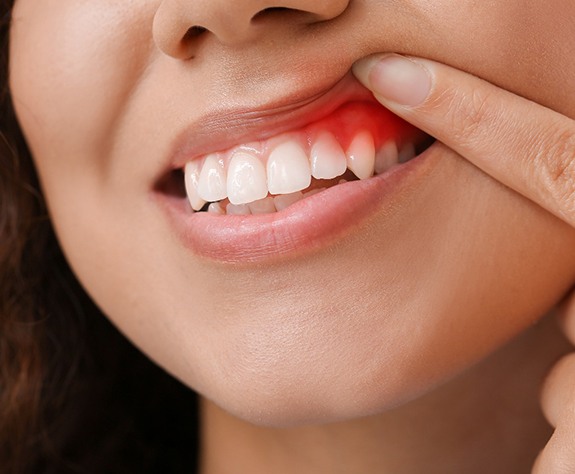
The gums are the soft tissues surrounding your teeth, supporting them and protecting their roots. When these tissues become infected, the result is gum disease. While it’s still in the first stage (also known as gingivitis), gum disease can sometimes be reversed. However, if it turns into periodontitis, it will become incurable. At that point, all you can do is take the appropriate measures to stop it from growing worse.
Symptoms of Gum Disease
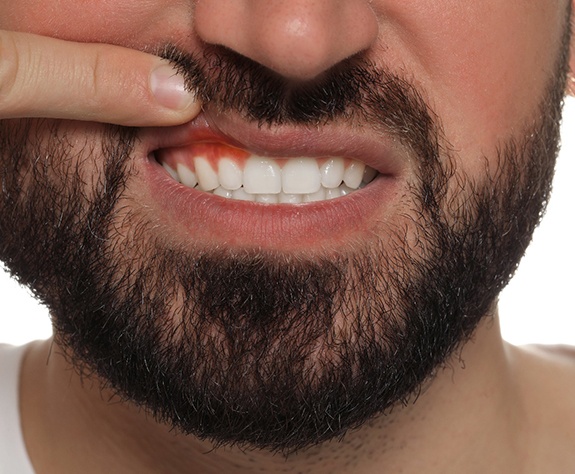
Do your gums appear unusually red or swollen? Do you often find blood on your toothbrush or your dental floss? Do some of your teeth look longer than you remember? Have you recently noticed a change in your bite? Are any of your permanent teeth loose? If you answered “yes” to any of these questions, you may have gum disease and should pay our office a visit in the near future to start exploring your treatment options.
How Do We Treat Gum Disease?

When we find signs of gum disease, we will consider your symptoms very carefully. We will then give you our suggestions for treatment based on how severe your situation is. Below is a brief summary of two possible approaches: deep cleaning (also known as scaling and root planing) and antibiotic treatment.
Scaling & Root Planing
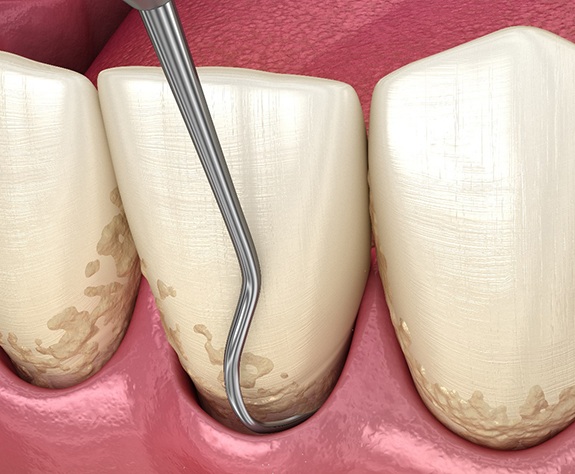
Other than protecting your teeth from decay and cavities, you also want to keep your gum tissue in mind. While periodontal (gum) disease is one of the most common issues people face, it’s fairly easy to prevent it as long as you take the proper precautions. If brushing and flossing alone isn’t changing your situation, then our team will likely recommend scaling and root planing to more thoroughly clean underneath your gum line.
Do I Need Scaling & Root Planing?
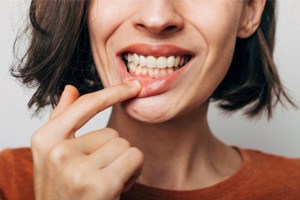
In the majority of cases, our dental practice will suggest undergoing scaling and root planing for patients experiencing advanced gum disease. Certain indications of this problem may involve bleeding, chronic bad breath (halitosis), receding gums, difficulty chewing, and visible plaque buildup. Should you notice any of these, be sure to notify our team right away for help. We can evaluate your situation and determine the best approach to addressing the issue. The sooner we’re able to treat gum disease, the higher the chance of preserving your smile.
The Process of Scaling & Root Planing
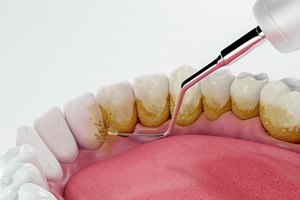
Scaling and root planing is typically a two-step process that occurs over the course of two appointments. First, your dentist will need to clear all of the plaque and tartar from your teeth as far down as the pockets of your gums, controlling the bacteria accumulation in your mouth. This is known as scaling, which goes further than normal teeth cleaning. If necessary, we’ll provide you with a local anesthetic to ensure that you’re comfortable and pain-free throughout the process.
Then, our team will perform root planing—a process involving smoothening out the surface of the roots of the teeth and removing any hardened deposits of bacteria that could lead to tooth loss. This will help promote receding gum tissue to reattach to your teeth while minimizing the chances of germs settling in the area again.
Aftercare Tips for Scaling & Root Planing

The procedure for scaling and root planing itself shouldn’t involve any pain. However, once we’ve finished the treatment, you’ll likely feel some normal, mild discomfort or soreness. Due to the thorough cleaning and plaque removal process, your teeth might feel sensitive for a few days, and your gums might experience some bleeding and/or swelling. The best thing to do is to take pain relievers as instructed while making sure to focus on controlling any potential infection during your recovery.
That’s why our team will provide you with detailed aftercare instructions. These should involve things like brushing, flossing, and rinsing with mouthwash regularly. We may even recommend antibiotics depending on your specific condition. After a couple of weeks or less, your gums should completely heal and feel more comfortable. Be sure to avoid sharp, hot, or spicy foods during your healing process. If you notice any problems during your recovery, don’t hesitate to notify us for help.
Antibiotic Treatment

Since gum disease is caused by harmful oral bacteria, antibiotics are naturally often an effective way to combat it. We may suggest having antibiotic treatment performed in addition to scaling and root planing. If we believe that antibiotic treatment is right for you, we will give you a detailed overview of the type of antibiotic that we’re recommending. Be sure to carefully follow any instructions that our team provides.
